Fabulous and fashionable: how the FAB Lab is encouraging fashion entrepreneurs
Fashion can give you the confidence and power to express yourself. Around the world, people use clothes, jewellery and accessories as a way to celebrate their individuality. But for young fashion enthusiasts who want to create their own fashion business, the competition is tough as high-street brands and online retailers dominate the market. To help them forge a path into the world of fashion, Dr Samii Kennedy Benson has established the FAB Lab, a business incubator at Southern University and A&M College in Louisiana, USA, that gives young fashion entrepreneurs the skills they need to be successful.
Talk like a fashion entrepreneur
Apparel — any form of clothing or garment
Business incubator — an organisation or programme that gives new businesses the support and resources they need to grow and become successful
Draping — the process of positioning and pinning fabric on a mannequin to create prototypes of new clothing designs
Entrepreneur — someone who starts their own business
Entrepreneurial self-efficacy (ESE) — an individual’s confidence in their own ability to create a successful business
Merchandising — the methods used to promote and sell products to customers
Pattern drafting — the process of using body measurements to create pattern pieces which become the foundation for designers to create garments
As humans, we can all feel the need to express ourselves, to share our feelings with others and to show the world who we are. Some of us find expression through playing music or painting pictures. Others express themselves through the work they do or the relationships they have with friends and family.
One of the most vibrant and versatile forms of self-expression is fashion. Clothes and accessories can provide the colours, textures and patterns that we need to express our personalities and interests. From a t-shirt promoting your favourite band to a colourful pair of mismatched socks, you can use fashion to help you find and fit into your community, or to celebrate your individuality and stand out from the crowd.
Around the world, people also use clothing and jewellery to express their heritage and celebrate their cultural identity. Blending traditional items with modern fashion trends can help people find their own unique style. This process of curation and creation can be empowering. Designing bespoke garments, creating new outfits or altering unwanted items can help you take control of your identity. For some people, designing and creating clothes is more than a passionate hobby, it is a career aspiration.
However, starting a fashion business is not easy. Budding apparel and fashion design entrepreneurs face stiff competition from high-street brands and online retailers. To succeed in the world of fashion, these up-and-coming entrepreneurs need more than just a steady hand and a good fashion sense; they also need business skills and support from others in the industry.
This is why, at Southern University and A&M College in Louisiana, Dr Samii Kennedy Benson has established the Fashion and Apparel Business Laboratory (FAB Lab), where she hopes to help fashion students gain the skills they need to run their own businesses.
What is the FAB Lab?
The FAB Lab is a business incubator to help up-and-coming fashion entrepreneurs. Specifically focused on fashion design and apparel entrepreneurship, it provides a nurturing environment in which Samii’s students can develop their fashion skills and hone their business ideas. “Business incubators are important because they help budding entrepreneurs turn their ideas and concepts into a viable enterprise,” explains Samii.
Why did Samii establish the FAB Lab?
As an assistant professor of apparel, merchandising and textiles, Samii teaches students who are interested in fashion, design and entrepreneurship. “At the beginning of each course, I always ask my students what they hope to do after graduation,” she says. “Overwhelmingly, most say they want to start their own fashion business.” Samii established the FAB Lab because she wanted to give her students the knowledge, skills and tools they would need to become successful entrepreneurs and run successful fashion businesses.
“The FAB Lab is particularly focused on supporting women and minority entrepreneurs,” says Samii. “In addition to the difficulties that come with running a business, they often face unique challenges, due to racism and gender bias, that can get in the way of their success.” While current trends indicate there is a rise in entrepreneurship among people of colour, minorities still make up just 15% of small business owners in the US.
Many factors contribute to the lack of entrepreneurial activity among women and people of colour. “One significant factor is a lack of entrepreneurial self-efficacy (ESE),” explains Samii. “This refers to an individual’s level of self-confidence in their ability to succeed in creating a successful business. If someone has low ESE, they may not believe that creating and owning their own business is a realistic option for them.” Evidence indicates that entrepreneurship educational initiatives, such as the FAB Lab, can help to improve ESE among people from minority backgrounds. Samii’s goal is for the FAB Lab to instil confidence in her students, leading to greater diversity and representation among fashion entrepreneurs.
How does the FAB Lab train its entrepreneurs?
The FAB Lab runs four schemes, which not only support university fashion students, but also provide fashion and business training for local middle and high school students and community members. FAB Fellows are students enrolled in the apparel, merchandising and textiles degree programme at Southern University and A&M College. Each year, five FAB Fellows are supported as they develop their own fashion line or apparel business. This support comes in the form of mentorship, financial aid, access to design spaces and equipment in the lab, and the opportunity to market and sell their products at a local boutique retail store.
The FAB Fellows also help to lead the summer camp for FAB Youth. Each summer, ten local middle and high school students from minority backgrounds attend the 4-week-long camp, where they learn practical textile and fashion skills, as well as entrepreneurship skills, which give them an important head start as they embark on their journey into the fashion industry.
Any students or community members interested in fashion can become FAB Entrepreneurs. The FAB Entrepreneurs programme offers workshops, short courses and networking events to promote and support fashion entrepreneurship in the local area. These events include lectures and panels featuring guest speakers from the fashion industry, fashion showcases (where students share their collections) and portfolio reviews. To ensure the programme is accessible to the wider community, events are held in the evening and at weekends, as well as during normal working hours, with some events also accessible online. FAB Entrepreneurs can formalise their fashion training through the FAB Certificate, a series of fashion design and apparel entrepreneurship courses for which participants can earn college credits, covering topics such as the fundamentals of fashion entrepreneurship, creating a business plan, and digital communication and marketing.
The wealth of opportunities available through the FAB Lab provides budding fashion entrepreneurs with the skills needed to turn their talents for design into a viable business. These include design skills, such as sketching and making mood boards to spark new ideas, creation skills, such as sewing techniques, pattern drafting and draping to bring their creations to life, and entrepreneurial skills, such as business planning and brand development to share their designs with the world.
What successes has the FAB Lab had?
The initiation of the FAB Lab has been a great success. The first group of FAB Fellows helped to establish the FAB Lab by assisting in the design of the lab space and helping to select the new equipment. These students then worked in the lab space to perfect their business concepts, create samples for their fashion lines and conduct market research for their new fashion brands. “Two of these FAB Fellows have already launched their fashion brands and have begun selling their clothes to clientele!” says Samii.
“This summer, the FAB Lab hosted its first FAB Youth summer camp for middle and high school students,” she continues. The campers learnt entrepreneurial skills, including what characteristics they need to run their own business, as well as fashion design skills, such as sketching and sewing. “On the last day, participants took part in a fashion show to display the clothes that they made during their time at the camp.” Through the FAB Lab, Samii is inspiring and supporting the next generation of fashion entrepreneurs.
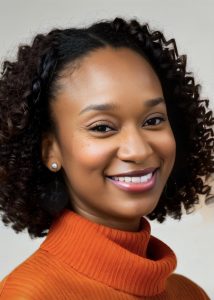 Dr Samii Kennedy Benson
Dr Samii Kennedy Benson
Assistant Professor of Apparel Merchandising and Textiles, Department of Family and Consumer Sciences, Southern University and A&M College, Louisiana, USA
Field of research: Fashion Entrepreneurship
Research project: Developing a business incubator to help fashion students gain the skills they need to successfully run their own businesses
Funders: US Department of Agriculture (USDA) – 1890 Institutional Teaching; Research and Extension Capacity Building Grants (CBG) Program, Grant Number 2021-38821-34718
About fashion entrepreneurship
“Small fashion and apparel businesses represent what’s new and innovative in the fashion industry,” explains Samii. While famous high-end fashion designers and large-scale high street bands might dominate the scene, small fashion businesses can be more creative in their marketing and designs as they have more freedom to ‘think outside the box’.
How can small fashion businesses address the challenges facing the fashion industry?
“Smaller brands are leading the way when it comes to social responsibility and environmentally sustainable practices,” says Samii. The negative impacts of ‘fast fashion’, such as the poor working conditions of people working in textiles factories and the huge amounts of waste caused when poor quality cheap clothing is worn a few times then thrown away, are beginning to take centre stage.
Small fashion businesses can promote ethical and sustainable business models, helping to tackle the fashion industry’s greatest issues. “I enjoy encouraging students to not only think creatively about fashion, but also to critically analyse the fashion industry’s ethical issues,” says Samii. “These include labour practices, environmental concerns, lack of diversity and the promotion of an unobtainable beauty ideal.”
Reference
https://doi.org/10.33424/FUTURUM419
Pathway from school to fashion entrepreneurship
• The best thing to do if you are interested in fashion entrepreneurship is to get creating! “Get a sketch book and start drawing designs,” advises Samii. Use YouTube tutorials to teach yourself to sew, knit or crochet and start making things. “You don’t need fancy equipment like a sewing machine and new fabric to start making clothes,” she says. “I taught myself to sew by hand with a needle and thread using my old clothes for my fabric!”
• If your high school offers classes in textiles, fashion, design, consumer sciences or business studies, take these to start learning about fashion and entrepreneurship. Other useful subjects include art (to enhance your creativity and learn new artistic techniques), mathematics (to learn the skills for dealing with your business’s finances) and English (to improve your communication skills).
• At college or university, take courses in fashion merchandising (to learn about the retail side of the fashion industry), apparel construction (to learn the basics of sewing clothing) and the history of art and fashion (to explore how and why fashions change).
• If you do not want to go to university, fashion internships and apprenticeships are a great way to gain hands-on, real-world experience of working in the fashion industry.
Explore careers in fashion entrepreneurship
• Explore the world of fashion by reading fashion magazines and websites. Samii recommends Teen Vogue (www.teenvogue.com), Fashion Bomb Daily (fashionbombdaily.com), Business of Fashion (www.businessoffashion.com), The Cut (www.thecut.com) and Women’s Wear Daily (www.wwd.com).
• Reach out to fashion professionals. Ask them questions about their career and whether they can provide you with work experience opportunities.
• If you are more interested in the merchandising side of fashion, pursue an entry level position in fashion retail. “If you are motivated and determined, you can successfully climb the career ladder to end in the area of the fashion industry that suits your skills and interests,” says Samii.
• The Art Career Project (www.theartcareerproject.com/fashion-careers) provides information about the range of career opportunities in the fashion industry, from designer to dressmaker, merchandiser to model, with details about what each role entails and how to get started in the field.
Meet Samii
My passion for fashion and love of sewing began in childhood when I taught myself how to design and sew clothes for my Barbie dolls. The movie Mahogany, starring Diana Ross as a famous Black woman fashion designer, was also inspirational for me as a young girl. As a teenager, my parents gave me a sewing machine and sewing lessons, and I began to make my own clothes. I was voted ‘Best Dressed’ in my senior year of high school due to my one-of-a-kind outfits!
For me, fashion is more than just clothing on a hanger or accessories on display. I view fashion not only as a multi-billion-dollar industry but as a cultural art form worthy of study, and it has been my outlet of expression for as long as I can remember.
I always wanted to be a teacher, like my mother, and I also wanted to work in the fashion industry in some capacity. While in high school, I took a fashion merchandising course at a local vocational school and realised I could combine my career aspirations of fashion and teaching. After an undergraduate degree in family and consumer sciences education, I taught child development, food science, interior design, and (my favourite!) fashion design and merchandising at a high school. After gaining a master’s in textiles, merchandising and interiors, I taught apparel, sewing and fashion courses at a community college. I returned to university to pursue my PhD in apparel, merchandising and design, for which I explored the experiences of Black female fashion design entrepreneurs for my dissertation research.
Teaching sewing is my calling, and it has always been my personal mission to ‘spread the joy of sewing!’ I established my sewing studio, That’s Sew Samii, to teach the valuable skill of sewing to people of all ages. My entrepreneurial journey has included many changes, including moving from a brick-and-mortar sewing studio to teaching individuals online, as I have learnt that a successful business knows when and how to pivot to best meet the needs of its clients.
Growing up as a young Black girl, I didn’t have many examples of someone who looked like me doing what I wanted to do. I hope to be the best role model for my daughters and my students, because representation matters. I want to show them that it is possible to do and be whatever they want in life, whether it’s in the fashion industry, or otherwise, no matter what they look like or where they come from. If I can do it, then surely, they can do it too!
Samii’s top tips
1. Be self-motivated: find that drive inside of you that helps you to keep going when things get tough.
2. Do your best in school: being the best student that you can be will open doors for your future.
3. Follow your passion: if you are not passionate about your work, you will never enjoy it, but if you do what you love, you will never work a day in your life.
Meet FAB Lab students
 “The FAB Lab taught me the skills to take my ideas from paper to the fashion marketplace and gave me the opportunity to showcase my designs at conferences, which lead to scholarships and future employment opportunities. I plan to continue designing and selling my faith-based urban clothing line and I hope to provide an outlet for women and children to express their faith through fashion.”
“The FAB Lab taught me the skills to take my ideas from paper to the fashion marketplace and gave me the opportunity to showcase my designs at conferences, which lead to scholarships and future employment opportunities. I plan to continue designing and selling my faith-based urban clothing line and I hope to provide an outlet for women and children to express their faith through fashion.”
Tiffany, FAB Fellow
 “During the FAB Lab summer camp, I most enjoyed making a newspaper dress as I was able to use my creativity to design and create it. I benefited from my involvement in the FAB Lab because I can now make lots of fashionable things. In the future, I would like to have my own fashion business and I hope to become a famous fashion designer.”
“During the FAB Lab summer camp, I most enjoyed making a newspaper dress as I was able to use my creativity to design and create it. I benefited from my involvement in the FAB Lab because I can now make lots of fashionable things. In the future, I would like to have my own fashion business and I hope to become a famous fashion designer.”
Zakiah, FAB Youth
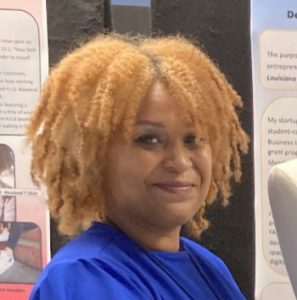 “I have greatly benefitted from the resources I receive as a FAB Fellow. The FAB Lab has given me the space and supplies to create my designs and fulfil my entrepreneurial goals. I really enjoyed helping to lead the FAB Youth summer camp, teaching middle and high school students how to sew and be a creative entrepreneur. My dream is to provide fashion-forward, sustainable clothing for plus-size women.”
“I have greatly benefitted from the resources I receive as a FAB Fellow. The FAB Lab has given me the space and supplies to create my designs and fulfil my entrepreneurial goals. I really enjoyed helping to lead the FAB Youth summer camp, teaching middle and high school students how to sew and be a creative entrepreneur. My dream is to provide fashion-forward, sustainable clothing for plus-size women.”
Darlynn, FAB Fellow
 “I enjoyed the FAB Lab summer camp as I learnt how to sew, so now I can create the designs in my sketch book. My favourite activity was the end-of-camp fashion show where we got to show off what we designed! In the future, I hope to become an art teacher and professional nail artist with my own nail salon.”
“I enjoyed the FAB Lab summer camp as I learnt how to sew, so now I can create the designs in my sketch book. My favourite activity was the end-of-camp fashion show where we got to show off what we designed! In the future, I hope to become an art teacher and professional nail artist with my own nail salon.”
Honour, FAB Youth
Do you have a question for Samii?
Write it in the comments box below and Samii will get back to you. (Remember, researchers are very busy people, so you may have to wait a few days.)

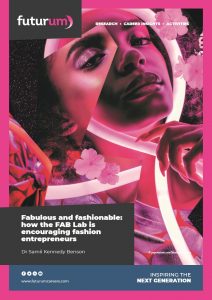
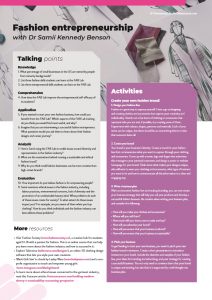
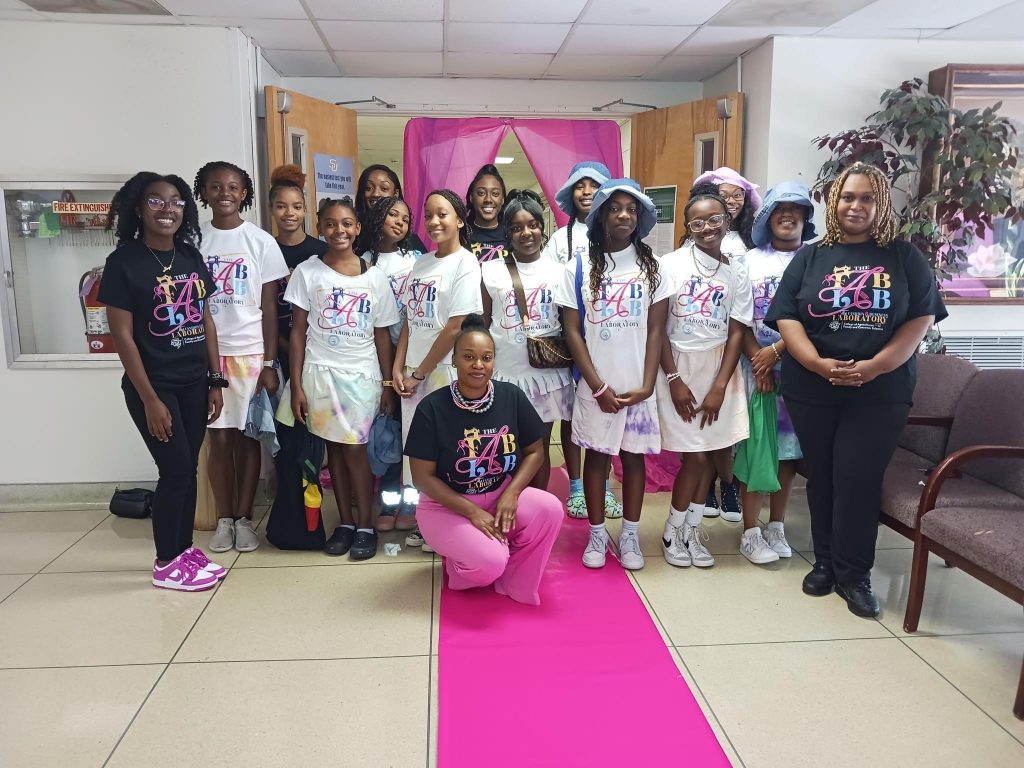
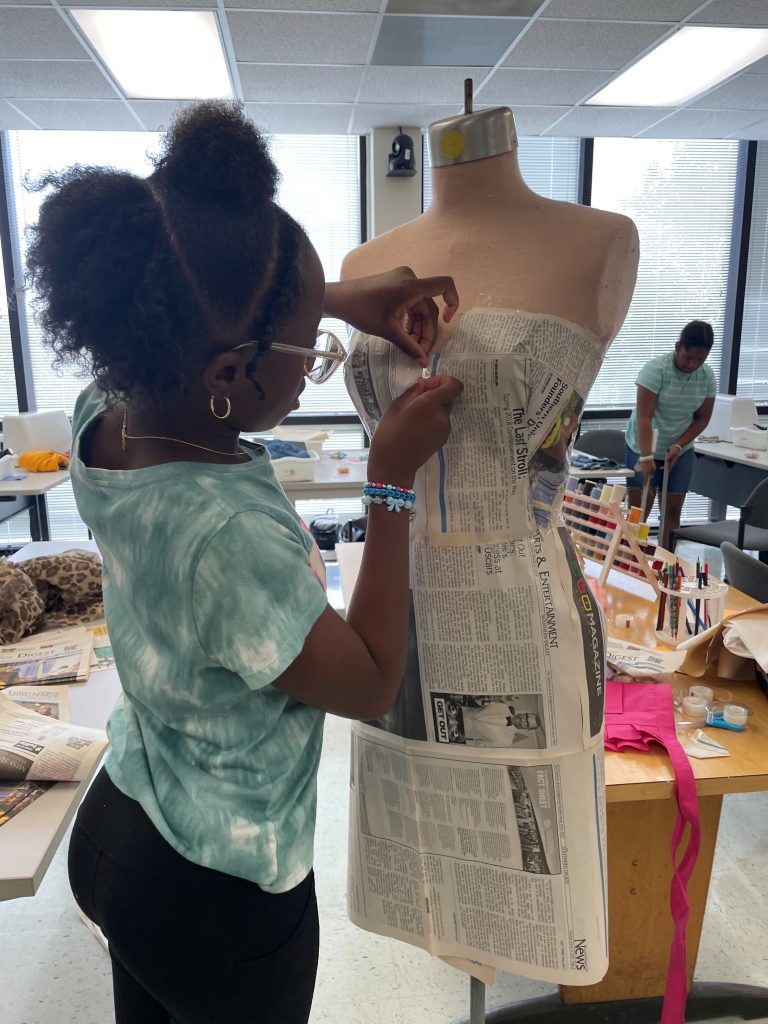
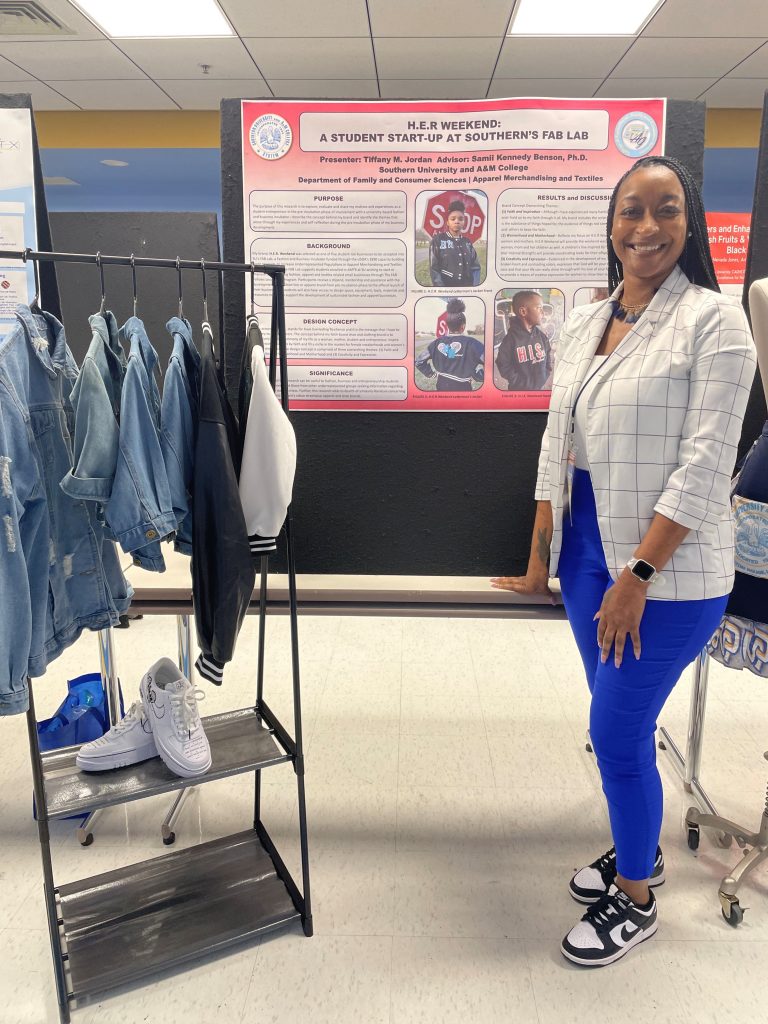
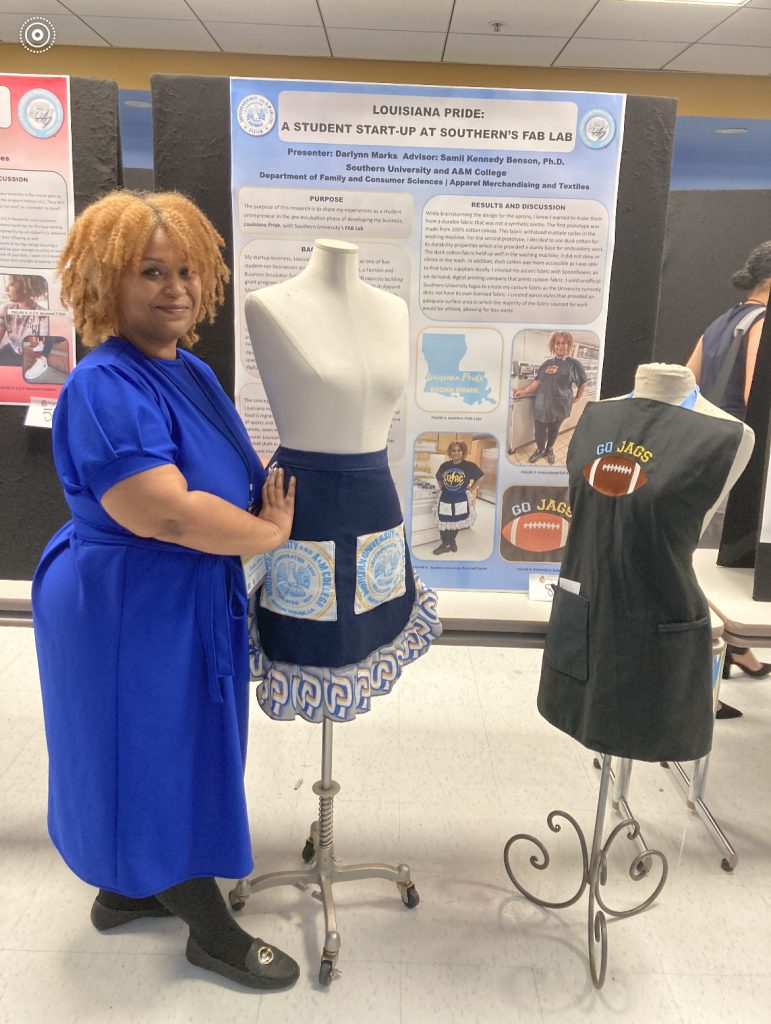
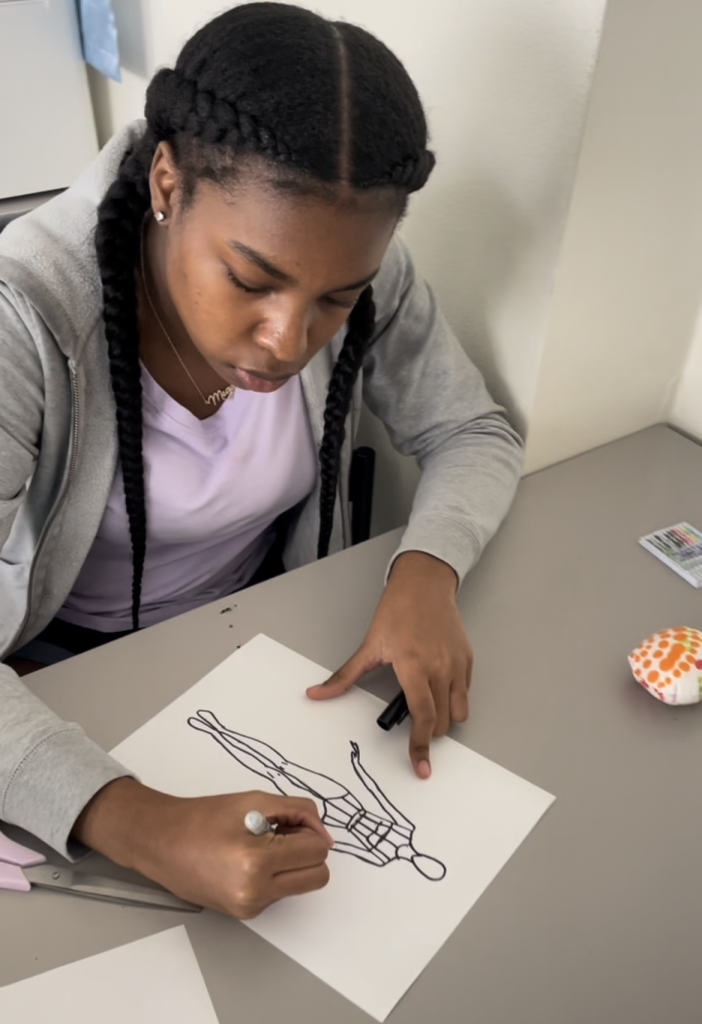
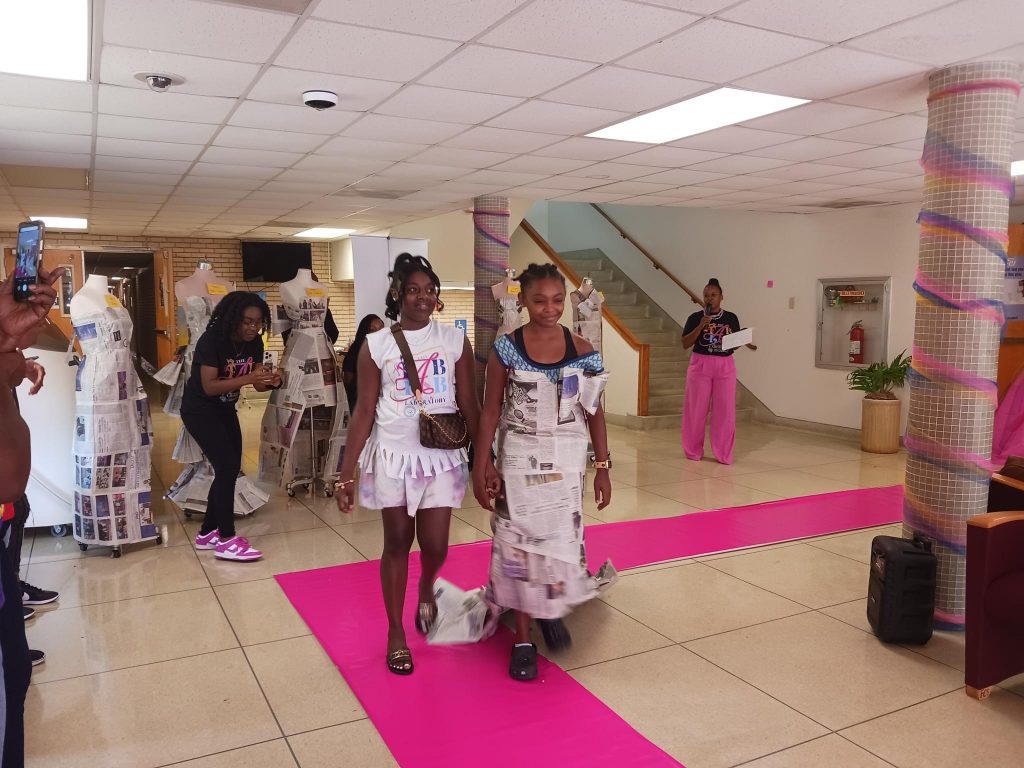
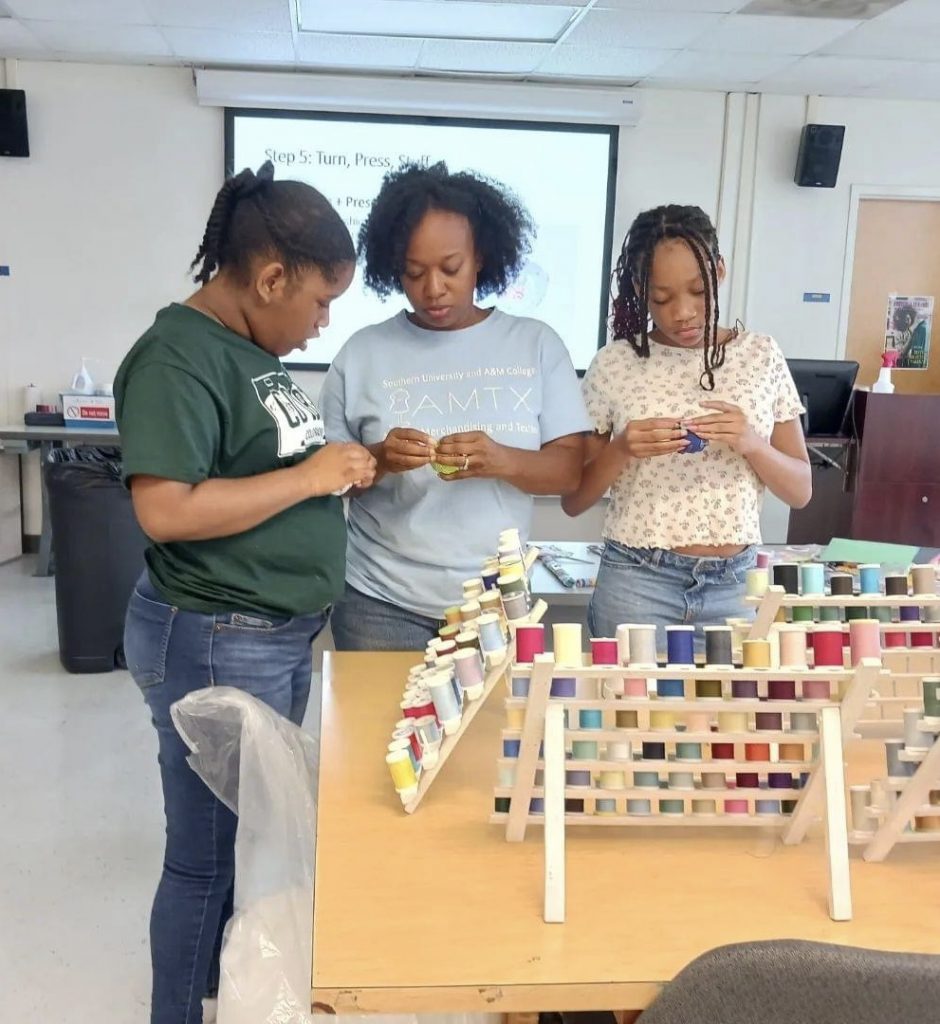
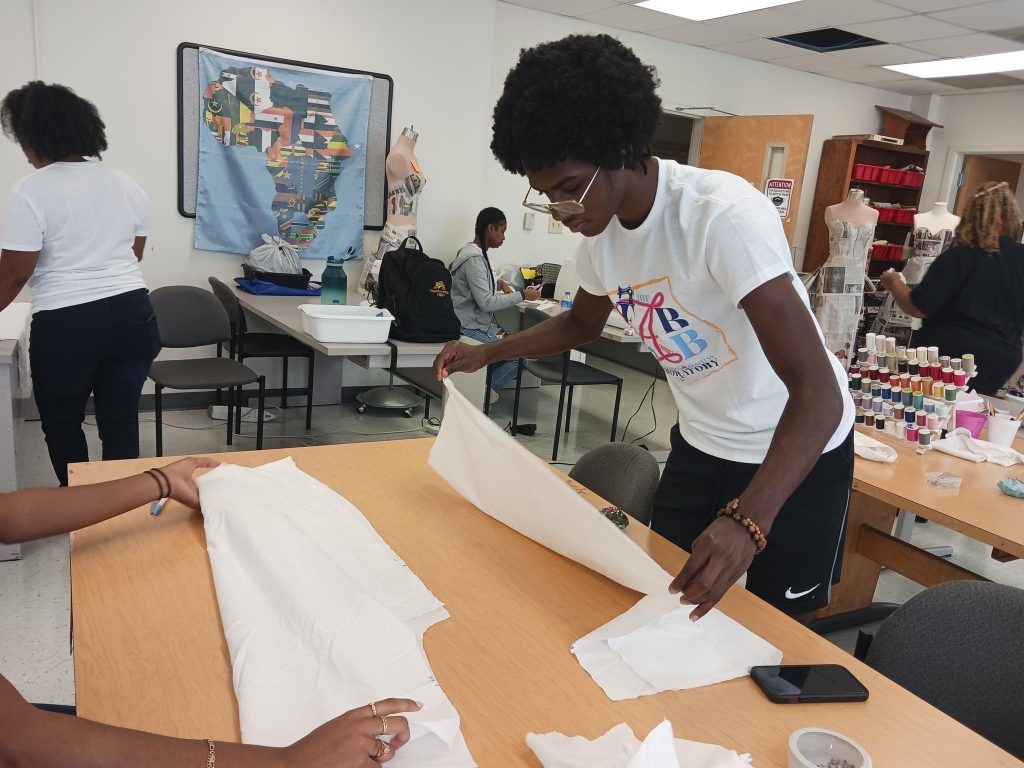
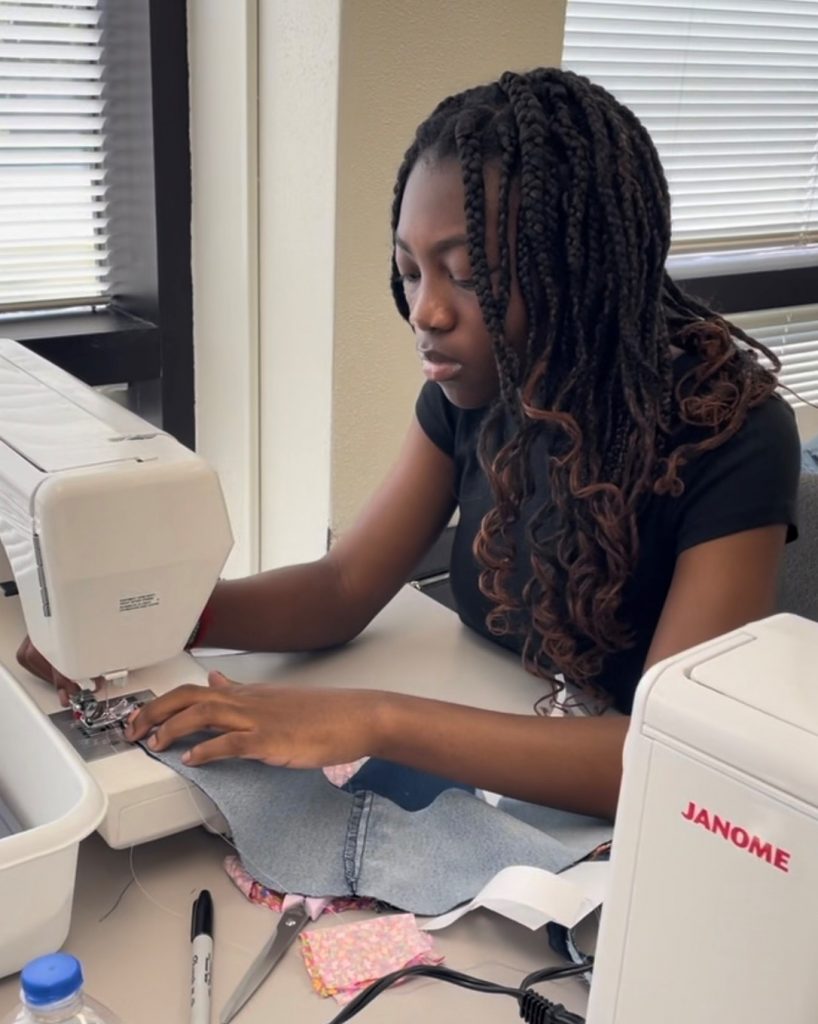
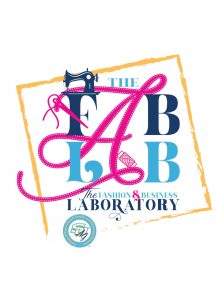



This is a wonderful learning experience that Dr. Benson created!
Thank you so much for reading and your kind words!
I am the Executive Director of a community non-profit called Thinking Minds Ghana. Currently we are running a social intervention called Making Abolo Girls Great (MAGG) Project.
The MAGG PROJECT is providing sustainable jobs by giving opportunity to marginalized groups made up of disadvantaged single mothers, street hawkers, petty traders etc. in the lower Manya Municipal district in Ghana to get back into mainstream education through innovative and tailor-made Technical, vocational and entrepreneurship training programs.
We need the support and partnership with organizations to help execute this life changing project. If this is possible, I would like to further discuss how we can go about doing so. Thank you. I look forward to hearing from you soon.
Hello Seth, Thank you for your comment. I would definitely like to learn more about the MAGG project and how The FAB Lab could possibly collaborate on this effort. Please contact me at [email protected].
Hi Dr. Samii. I’m writing from South Africa, Johannesburg. Please could you verify if your email is correct or there is something missing? [email protected]. Is this correct? I would like to get in touch with you please. We are in the process of establishing a Fashion Incubator for placement of Interns from our local Technical and Vocational Education and Training (TVET) College(s) who require 18 months Work Experiential training to qualify for their Diploma qualification. I’m very inspired by your approach to the FAB Lab.